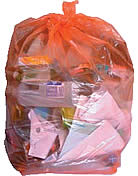Wandsworth Residents Are The UK's Second Greenest
Experian's recent report show 60% of the residents are "eco-evangelists"
These ‘eco-evangelists’ make a real effort to be more environmentally aware. This is the highest proportion in any mainstream local authority, with only the City of London scoring higher.
Experian has divided people into ten different types. Eco-evangelists tend to be well educated, have high incomes and know a lot about carbon off-setting.
At the other end of the scale the ‘wasteful and unconvinced’ tend to be on low incomes, live in social housing and be unwilling to make the sacrifices they think are necessary to be greener. Only eight per cent of Wandsworth residents are in this category, compared to 34 per cent in Tower Hamlets.
Other categories include ‘confused but well behaved’, ‘too busy to change’ and ‘why should I bother’.
 The report also measures the total carbon emissions per household. Wandsworth is placed almost halfway down the list of 434 local authorities. This is despite the fact that wealthier people tend to have larger carbon footprints because they fly more and use more energy in the home.
The report also measures the total carbon emissions per household. Wandsworth is placed almost halfway down the list of 434 local authorities. This is despite the fact that wealthier people tend to have larger carbon footprints because they fly more and use more energy in the home.
The council has welcomed the report because it will help it identify trends and plan environmental services more effectively. Cabinet member for environment and leisure, Cllr Sarah McDermott, said:
" the council is constantly re-examining its environmental policies to ensure they best meet the needs of residents. This includes policies on sustainable transport, parks and open spaces, purchasing, energy efficiency and, more recently, climate change."
 “This report reinforces what our experience has already told us. Many of our residents want to be green so we have chosen to make it as simple as possible for them. For example, our orange sack scheme enables all recyclable materials to be collected together. Residents that are less likely to recycle are receiving more support. Recycling advisors are running a door-knocking scheme on estates which use orange recycling banks. We have also made it clear to our residents that reducing energy use and producing less waste in the first place helps the environment and reduces council tax bills because our costs are reduced.”
“This report reinforces what our experience has already told us. Many of our residents want to be green so we have chosen to make it as simple as possible for them. For example, our orange sack scheme enables all recyclable materials to be collected together. Residents that are less likely to recycle are receiving more support. Recycling advisors are running a door-knocking scheme on estates which use orange recycling banks. We have also made it clear to our residents that reducing energy use and producing less waste in the first place helps the environment and reduces council tax bills because our costs are reduced.”
December 1, 2009
Related links
|